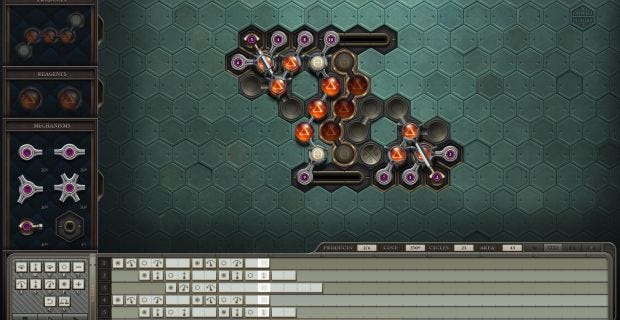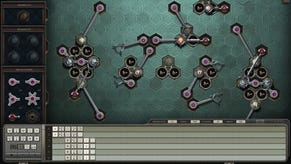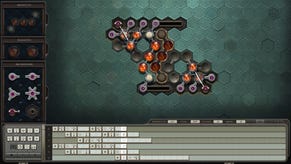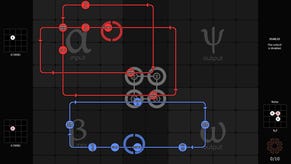Opus Magnum's alchemy machines are gorgeous
Alchemy, alchemy, they've all got it alchemy
I am raising my head from the alchemy desk to tell you: Opus Magnum is out now and it is good. It's the new puzzle game from Zachtronics which crept up on us this week. This studio’s puzzlers have a definite flavour to them. They’re about fiddling with machines, hacking together a solution out of strange gadgets and mental duct tape before revealing a loudly-ticking device and feeling impossibly proud of yourself. This is no different, except that your end results are flipping gorgeous.
First, just look at some of these machines.
The game lets you record a GIF of your solution, once finished. I stole all these from gamemaker Tom Smith, but it’s easy to see why he feels proud of these clockwork cuties.
Don’t even try to understand them for now. Just enjoy the beauty of their regularity.
They are hypnotic, looping contraptions with style and purpose.
Function meets form.
OK, not that one. That's me trying to make an "owl".
There’s usually a storyline to Zachtronics games. This time you’re an alchemist (and a haughty, smart-arse one at that). You build transmutation engines on a hex-based grid using mechanical arms, pistons, tracks, and so on, bonding atoms of salt and water together to make new alchemical products and pooping them out at the end of it all. Atoms can’t collide and some components will get in the way of others. You need to make the right size, shape and combo of atoms, then rotate and shift the molecule around until it's where it needs to be.
There are other types of atom, of course, but I don’t know what they are yet, because I have spent 2 hours on the first proper puzzle. I don’t mean that it has taken me 2 hours to solve the puzzle – that takes a few minutes. I mean I spent two hours toying with the first puzzle. I was so taken with the freedom of the engineering tools that I just kept trying to reinvent a simple water-making gizmo. “How do I make this more efficient?” I asked myself. “How do I make it faster? How do I make it more ridiculously elaborate?”
It’s a familiar feeling if you’ve played Shenzhen I/O, Infinifactory, SpaceChem (there’s a reason Alice refers to them as Zachlikes) and possibly even The Codex of Alchemical Engineering - the old flash game this is based upon. A leaderboard showing both the global statistics and the scores of your friends pushes you to revise your solutions almost immediately. How did my friend Dan make a glorified water-cooler in just 25 cycles!? I cannot tell you, I’ve lost the GIF he sent me depicting the solution. But I remember remarking that it was obscene.
It’s in early access and I’m still in the opening chapter, so I don’t know how much of the game is present and accounted for. I would be satisfied if it was only the first handful of puzzles. Not sated, but satisfied. It also feels like a good entry point for anyone toying with the idea of Zaching around. Visually, it's a lot more understandable than say TIS-100. There’s no language you have to learn, save for the symbols used to give the machine parts their commands. And these are all rooted in some physical movement, not abstract mathematics. A piston’s arm reaching out for an orb-like atom of white salt, not a “dat” moving numbers to an “acc”.
I’m going to crack on with my alchemy studies. But know that if you’re not already a Zachist, this might be the best time to become one. It’s on Steam for £15.49 .

















